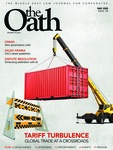Law firm highlights
· Al Tamimi & Company has led the first Rights Issue on the Dubai Financial Market (DFM). The Rights Issue, launched by DFM-listed Takaful Emarat, the Shari’ah-compliant life and health insurer, was 36.51 per cent oversubscribed, with AED 68.25 million shares fully subscribed. The National Bank of Abu Dhabi (“NBAD”) has acted as the lead financial advisor for the Company. Ahmed Ibrahim, partner & head of equity capital markets, Al Tamimi & Company, said,“We expect that other insurance companies and banks will raise their issued capital during 2016, and it will be fascinating to see how many other companies and banks will tap into this. Being the first Rights Issue in Dubai, the management team of DFM has demonstrated a very cooperative attitude and a very pragmatic approach.” Takaful Emarat’s Rights Issue was launched on November 1 and closed on December 12. The proceeds will be used to capitalise on the Company’s recent restructuring under a new management team and its return to operating a profitable underwriting model. Building on this growth, the new capital will be used to strengthen Takaful Emarat’s back office function, grow and develop its distribution channels and sales network across the UAE in particular in the Northern Emirates.
· Following planned changes in employment contracting procedures to come into effect in the UAE on January 1st, 2016 as well as recent changes in Qatar regulating the payment of salaries, senior Legal and HR executives attended a gathering in Abu Dhabi yesterday to consider the impact of these changes. The gathering built on a recent successful employment event in Dubai hosted by Dentons in collaboration with the Association of Corporate Counsel Middle East (ACCME). With presentations by Dentons partner Ibrahim Elsadig and associate Nadine Naji, the event focused on recurring queries surrounding the types of employment contracts, employee benefits, end of service gratuity and restrictive covenants. There was also much discussion around the anti-discrimination law which recently came into effect in the UAE, where delegates discussed the nuances to be considered relating to areas such as age, nationality and gender which are not directly listed in the new law but are topical areas encountered in other jurisdictions.
· DLA Piper achieved a significant victory on behalf of the Sultanate of Oman, in the first-ever claim under the US-Oman Free Trade Agreement. The award was issued November 3 by a three-person Tribunal constituted under the FTA. DLA Piper was retained in 2011 to represent the Sultanate of Oman against an initial claim of more than USD580 million in damages by a US investor in connection with the termination of a limestone quarry concession in Oman. The claim was submitted to the International Centre for the Settlement of Investment Disputes (ICSID) under the auspices of the World Bank. The ICSID Tribunal dismissed each of the claims alleging expropriation, breach of the fair and equitable standard, and breach of the national treatment standard. Concluding that Oman had been required to defend itself against charges that had "ultimately proven to be entirely unmeritorious," the Tribunal further made a cost award in Oman’s favour in excess of USD5.5 million. The Tribunal considered novel questions of international law arising from a new generation of investment treaty that, for example, narrowed the grounds for attribution of State responsibility and prioritised the Contracting States' rights to enforce their environmental laws. The DLA Piper International Arbitration team included Stanley McDermott III, Kiera Gans and Rana Bahri in New York with Bruce Mullins and Sarah Al-Moosa in Muscat, and Bob Gruendel in New York.
· Stephenson Harwood hosted an employment law seminar panel discussion on the topic: ‘Gratuity – a measured asset or a black hole?’ at the DIFC Conference Centre on December 22, 2015. The expert panel comprised of Anne Pritam (partner), Philip Goodchild (partner) and Shiraz Sethi (associate) of Stephenson Harwood, Lynda O'Mahoney (head of business development) of Capita Asset Services and Simon Fielder (managing partner) of Ryland Gray. The panel discussed some of the factors affecting end of service liabilities and what can be done to mitigate risk to companies in the region. The seminar tackled the key issues concerning gratuity in the region and looked at aspects from both UAE and DIFC law perspective. Sethi used calculations and case studies to talk about what an employee is entitled to in case of termination, pension provisions under DIFC law, key considerations under UAE Labour Law and DIFC Employment Law and the grounds upon which gratuity can be withheld under both the laws. O’ Mahoney focused on the employers – on the risks involved, the importance of addressing issues, benefits and the possible solutions of dealing with end of service payments. Fielder talked about the aim, benefits and structure of active gratuity funding as a recruitment, reward and retention tool for employees. The panel invited and addressed questions from the audience through their individual iPads provided by Eventpad. Live polling questions were put to the audience and ‘real’ time results were projected on the big screens and discussed by the panel. Turn to page 26 & 27 where Fielder, O’Mahoney and Sethi share their thoughts on avoiding the gratuity black hole.


























































































































